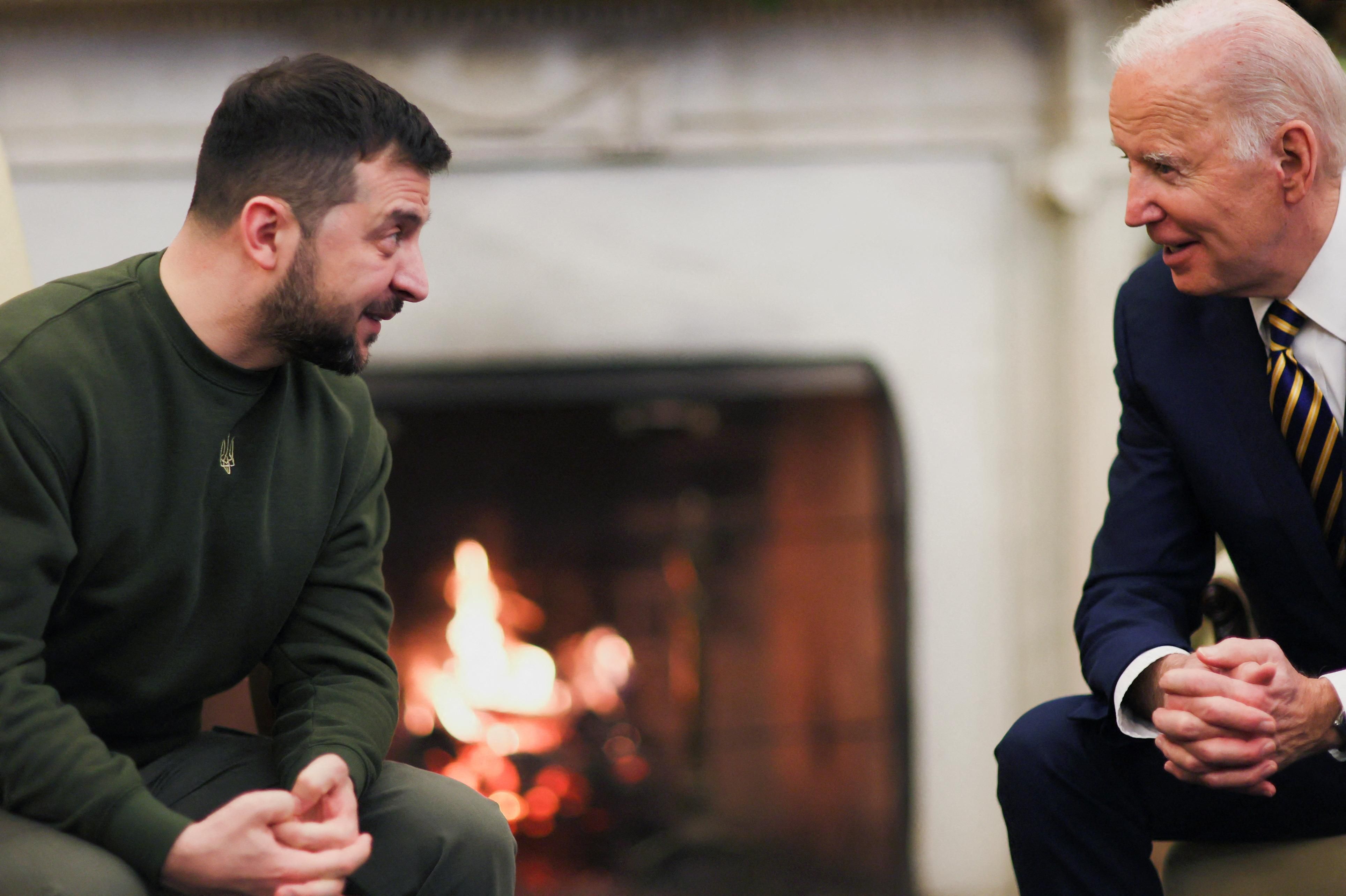Days after Russia invaded Ukraine on Feb. 24, Ukrainian President Volodymyr Zelensky turned down US officials who offered to get him out by famously quipping: "I need ammo, not a ride."
Almost 10 months later, he finally got both.
The US and its NATO allies have given Ukraine a lot of weapons (and cash, too). And on Wednesday, Zelensky finally took that US airlift … to make his first foreign trip since the war began to Washington, DC.
“Your money is not charity. It is an investment in global security and democracy that we handle in the most responsible way,” Zelensky said during his speech to the US Congress, which some have compared in historical significance to Winston Churchill’s after Japan's Dec. 1941 attack on Pearl Harbor.
What a whirlwind year 2022 has been for Zelensky. When Russia invaded, many in the West feared it would be a cakewalk. They also doubted Zelensky, a 44-year-old former TV comedian and novice politician, would have the chops to lead his country at war against mighty Russia and the steely Vladimir Putin.
But 300 days into the war, the Ukrainians are still, in their president's own words, "alive and kicking." They've beaten back the Russians from most of the territory they had taken — thanks to both Russian military underperformance and stronger-than-expected Ukrainian resistance. The only thing that’s worked for Russia so far is hitting energy infrastructure to leave civilians cold and dark.
None of this would have been possible without Western aid. Beyond the symbolism of going to the White House and addressing Congress, that's what Zelensky's trip is all about.
Time is of the essence. The annual spending bill unveiled by Congress on Tuesday allocated almost $45 billion for Ukraine, more than half of which will go directly to beefing up the country's military muscle to fight Russia. Meanwhile, the State Department announced that the US would for the first time send a Patriot missile defense system — which Ukraine has been demanding for months.
"If your Patriots stop the Russian terror against our cities, it will let Ukrainian patriots work to the full to defend our freedom," Zelensky, clad in his trademark olive-green army fatigues instead of a suit, told US lawmakers.
As far as the US president is concerned, America’s love for Ukraine is mutual and unwavering. “We will stay with you for as long as it takes,” Joe Biden assured Zelensky during a joint press conference.
But how long for whom? Congress is set to lock in funding until late summer, when US support for Ukraine might enter a new phase under the GOP-held House whose likely next speaker has already signaled that he won't give Zelensky a blank check.
When it's time to top up Ukraine’s balance, the Biden administration might face a perfect storm of crises: dealing with an influx of asylum-seekers at the southern border, funding the government for the next fiscal year, raising the debt limit, and avoiding a possible recession triggered by interest rate hikes to fight inflation.
America's commitment to Ukraine "will be challenged by Republican lawmakers who see the US sending money overseas but not securing the southern border, and by Democratic lawmakers who will question why more isn't being done to fight a potential economic slowdown here," Eurasia Group's US Managing Director Jon Lieber says in this week's US Politics in 60 Seconds.
Finally, optics also matter. The same week that the boss of NATO rolled out the red carpet for Zelensky, Putin barely got a shrug from one of his few remaining allies, President Alexander Lukashenko of Belarus. Unlike Biden with Ukraine, Lukashenko has little to offer Russia beyond a photo-op and Belarus as a launchpad to attack Ukraine.
And although Putin would appreciate US Republicans doing him a favor by penny-pinching Kyiv, he can’t afford to wait that long as the war drags on and the Ukrainians build momentum on the battlefield.
"Russia may indeed have that hope but won't be able to count on it,” says Eurasia Group analyst Zach Witlin. “Ukraine support is robust so far and not showing any signs of weakening, and it will take some time before the question rises again."
More For You
People in support of former South Korean President Yoon Suk Yeol rally near Seoul Central District Court in Seoul on Feb. 19, 2026. The court sentenced him to life imprisonment the same day for leading an insurrection with his short-lived declaration of martial law in December 2024.
65: The age of former South Korean President Yoon Suk Yeol, who was sentenced to life in prison on Thursday after being found guilty of plotting an insurrection when he declared martial law in 2024.
Most Popular
In an era when geopolitics can feel overwhelming and remote, sometimes the best messengers are made of felt and foam.
The Hungarian election is off to the races, and nationalist Prime Minister Viktor Orbán is facing his most serious challenger in 16 years.
Does skepticism rule the day in politics? Public opinion data collected as part of the Munich Security Conference’s annual report found that large shares of respondents in G7 and several BRICS countries believed their governments’ policies would leave future generations worse off.
